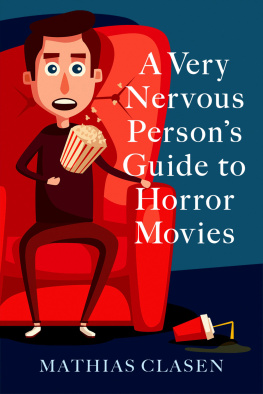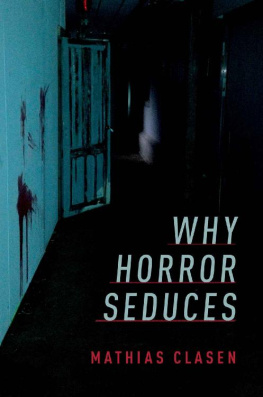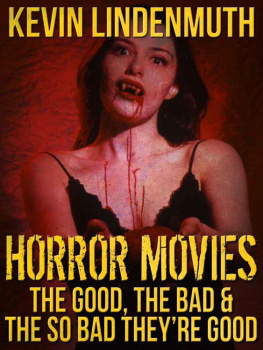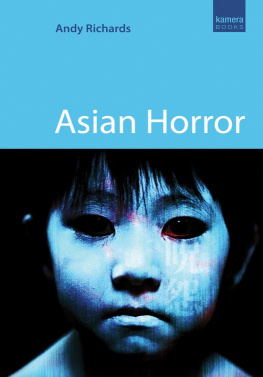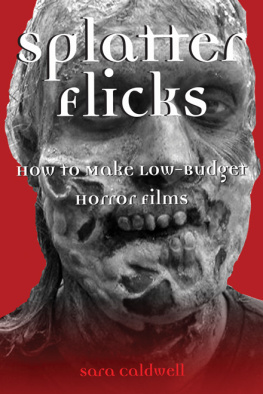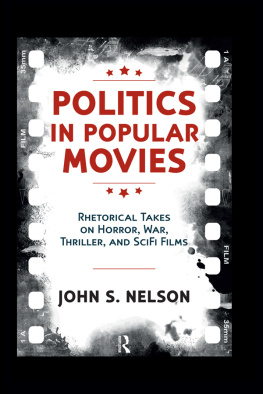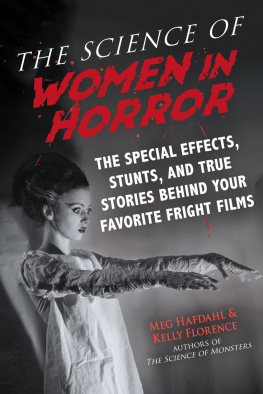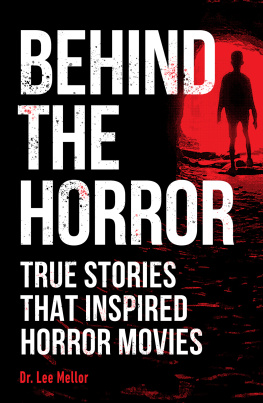A Very Nervous Persons Guide to Horror Movies

Oxford University Press is a department of the University of Oxford. It furthers the Universitys objective of excellence in research, scholarship, and education by publishing worldwide. Oxford is a registered trade mark of Oxford University Press in the UK and certain other countries.
Published in the United States of America by Oxford University Press
198 Madison Avenue, New York, NY 10016, United States of America.
Oxford University Press 2021
All rights reserved. No part of this publication may be reproduced, stored in a retrieval system, or transmitted, in any form or by any means, without the prior permission in writing of Oxford University Press, or as expressly permitted by law, by license, or under terms agreed with the appropriate reproduction rights organization. Inquiries concerning reproduction outside the scope of the above should be sent to the Rights Department, Oxford University Press, at the address above.
You must not circulate this work in any other form and you must impose this same condition on any acquirer.
Library of Congress Cataloging-in-Publication Data
Names: Clasen, Mathias, author.
Title: A very nervous persons guide to horror movies / Mathias Clasen.
Description: New York, NY : Oxford University Press, [2021] |
Includes bibliographical references and index.
Identifiers: LCCN 2021010152 (print) | LCCN 2021010153 (ebook) |
ISBN 9780197535899 (hardback) | ISBN 9780197535905 (paperback) |
ISBN 9780197535929 (epub)
Subjects: LCSH: Horror filmsHistory and criticism. |
Horror filmsPsychological aspects. | Fear in motion pictures. |
Motion picture audiencesPsychology.
Classification: LCC PN1995.9.H6 C518 2021 (print) |
LCC PN1995.9.H6 (ebook) | DDC 791.43/6164dc23
LC record available at https://lccn.loc.gov/2021010152
LC ebook record available at https://lccn.loc.gov/2021010153
DOI: 10.1093/oso/9780197535899.001.0001
To Joe Carroll, my friend and mentor
Contents
Thank you for picking up this book. I assume that you are a very nervous person with an interest in horror movies. Me, Im a horror researcher... and a fairly nervous person, at least when it comes to horror movies. I will tell you what a horror researcher does in a moment, but first, I will say a little about nervousness.
Nervousness gets a bad rap, but if our species were not constitutionally nervousan anxious hairless apewe would not be here today. Homo sapiens has fought its way through millennia of life-or-death struggle. Our ancestors traversed jungles teeming with hungry cats and sneaky serpents, they crossed deserts under the unforgiving glare of a prehistoric sun, and they sailed across restless oceans inhabited by huge, barely glimpsed beasts. Without some vigilance, some nervousness, our species would not have made it. Of course there is such a thing as too much nervousness. Some people are so nervously inclined that their anxiety gets in the way of their pursuit of happiness. But moderate anxiety is not necessarily a bad thing.
As I am writing this, in the summer of 2020, it seems that we are all chronically nervous. Anxiety is not just simmering, it is boiling. The novel coronavirus, SARS-CoV-2, is cutting a swath of destruction across the planet. If that were not enough, we are facing increasing political polarization and civic unrest, irreversible climate change, a biodiversity crisis, and other such items from Pandoras Big Box of Very Bad Stuff. The future seems to be harder to predict than ever before, and we humans detest the unknown. Fear of the unknown is, as one psychologist puts it, the one fear to rule them all.
With all this anxiety and nervousness going around, why would you want to read aboutlet alone watchhorror movies? Well, many people like to play with fear. Our species fearfulness is not only key to our success in terms of survival, it is also the engine in a range of leisure activities, from extreme sports over scary entertainment to frightening pretend play. Endlessly innovative, we humans have found a way to wring pleasure from our constitutional anxiety. I will be arguing in this book that we can get more than mere pleasure and diversion from horror moviesindeed, horror fiction may be a primary means through which we confront fear and anxiety. Recent research actually suggests that people who regularly watch horror movies are coping better with the COVID-19 pandemic than those who stay away from horror movies. It looks like habitual horror watchers are doing a better job of keeping negative emotions on a leash, maybe because they have more practice regulating their own fear and anxiety to keep from being overwhelmed by scary movies. (I will return to that research later in the book.)
As a horror researcher, I am interested in what horror is and what it does. My primary training is in literary and film study, and I work in an English department at Aarhus University, a large research university in Denmark. Most of my career has been dedicated to theoretical and interpretive work, but in recent years I have been branching out into more empirical workcollecting data, working with human subjects, measuring behavior and physiology, that sort of thing; all in an attempt to get deeper into the psychological machine room of the horror genre. I am lucky to have some brilliant colleagues who have been collaborating with me, and I recently received a large research grant from the Independent Research Fund Denmark to establish the Recreational Fear Lab. You can visit our homepage at www.fear.au.dk if you are interested in following our research.
Horror fascinates me because it is so paradoxical. Why would anybody in their right mind seek out entertainment designed to make them feel bad? And what does it do to them, this immersion in fictional universes that brim with blood, gore, and hairy monsters? What does horror mean? The roots of my professional interest in horror are in my own personal history. My childhood feelings toward horror were deeply ambivalent, but they morphed into full-blown fascination in my adolescence. I still cannot watch a horror movie alone, but I have grown to love the stuff. I hope to convey some of that enthusiasm, but that is not my main mission with this book. The main mission is to train the searchlight of science on a number of concerns my nervous reader might have about horror movies.
Before I began writing the book, I collected information on the kinds of concerns people have about horror movies via informal surveys on social media. For instance, I would ask on Twitter or Facebook about what made people nervous about scary movies. I looked for patterns in the information I received, and found that a lot of people are curious yet nervous about horrorand that certain concerns loom large.
The jump scare, for instance, is mentioned very often. Lots of people dread the jump scares that have become so common in horror movies. They do not like being blindsided by a massive shock to the system. As one respondent wrote, I hate [jump scares] so much I get angry just thinking about the worst ones Ive experienced. That is maybe a fairly trivial concern, compared to another high scorer: concerns about ones mental or physical health. As one respondent puts it, horror movies provide imagery for my brain to throw back at me when Im feeling scared, e.g. when Im walking home alone or looking out of a window when its dark outside. This can be years later! But can horror movies really traumatize you? Can you pass out or even die from horror movie fright?

